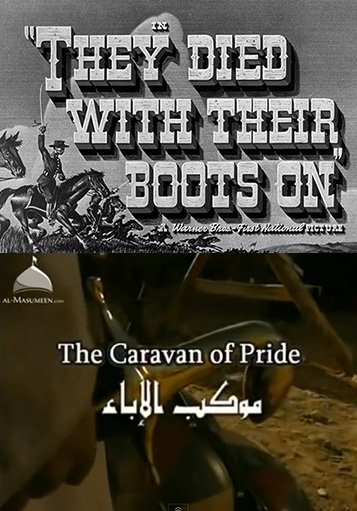
When I was young and impressionable, one of my favorite movies was They Died with their Boots On, the Errol Flynn movie about Custer’s last stand. There was Flynn/Custer with his sword raised out in front of his troops heading for the savage Indians. Had it been a fair fight, of course he would have won, but he stood his ground and was the last man standing. Watching this film recently, apart from the totally ahistorical plot of the made-for-Hollywood battle scene, I wonder how many horses were maimed from the trip wires. In a sense Flynn represented a hero against impossible odds, but in another it perpetuated the notion of the white man’s manifest destiny at the expense of the savage “red man.” I doubt it inspired any sarsparilla party types to go out and shoot any Indians, but it certainly reinforced a cultural bias that remains to this day.
I recently came across a film about the death of Husayn, the Prophet Muhammad’s grandson, at Karbala. This comes in Arabic and Urdu versions and is entitled “The Caravan of Pride” (موكب الاباء). Like the Flynn film, the bias in the film is evident from the start. This is a film highlighting the conservative Shi’a view of an evil and crazed Yazid. Watching the film creates sympathy for the tragic death of Husayn and his followers at the same time that it denigrates the incoming Umayyad caliphs as heretics. It is easy to forget that the event taking place happened in 61 AH/680 CE, before there were any of the Sunni law schools and five years before Abd al-Malik became caliph and authorized a new edition of the Qur’an. Whatever happened at Karbala, an event shrouded in mystery and rife with emotional distress, it was an event before there was what we have come to know as the Sunni/Shi‘a divide. The disclaimer at the start of the new film is overwhelmed by the emotional thrust of the plot.

In a perceptive analysis of Islamic “fundamentalism,” the Syrian intellectual Sadik al-Azm has noted the absurdity of a continuing feud among Muslims over Karbala. He writes:
Finally, having seen the Russians apologize to the Polish, Hungarian, Czech and Slovak peoples for past wrongs, having seen the whites in South Africa apologize to the black majority for the past injuries of apartheid, having seen the Japanese apologize to the Koreans for past persecutions, having heard of Arab petitions submitted to the Pope for an apology to the Muslim, Arab and Eastern Christian worlds for the wrong of the Crusades, and having learned of the positive response of Pope John Paul II to such petitions during his visit to the Omayyad Mosque in Damascus, in May, 2001, I plead in my own turn with the Sunni religious leadership in Iraq and everywhere else to apologize to the Shi’a of Iraq and beyond for the unspeakable crime of the Prophet’s grandson, Al-Husain in the Karbala massacre in the year 61 of the Muslim calendar. And just as the Pope had absolved and forgiven Jewish posterity from the blood of Jesus Christ, I plead with the Shi’a clerical establishments in Iraq and everywhere else to absolve and forgive Sunni posterity from the blood spilled in Karbala, mother of all Muslim crimes.” (Sadik al-Azm, “Islamic Fundamentalism Reconsidered: A Critical Outline of Problems, Ideas and Approaches,” In his On Fundamentalisms, p. 172, Berlin, Gerlach Press, 2014.)
The bloody sectarian violence that causes deaths in Iraq, Syria and elsewhere every day is stoked by dredging up past sins, but this has nothing to do with any Muslim today. Should the Mongols be villified because Khulugu sacked Baghdad? What about Sargon of Akkad, who conquered much of the Fertile Crescent in his day or the Pharaohs or Hittite overlords? The sins of the forefathers, especially those so emotionally charged and historically unresolvable, should not be visited upon the living. How much more blood need be shed before we rid ourselves of the ugly hatred in blood libel? The idolization of General Custer, like the martyrdom of Husain, is not just fiction and certainly more than mere entertainment. I agree with al-Azm; the time has come to forgive on all sides and live as the Prophet envisioned his umma. Let salam not haram be the companion of Islam.